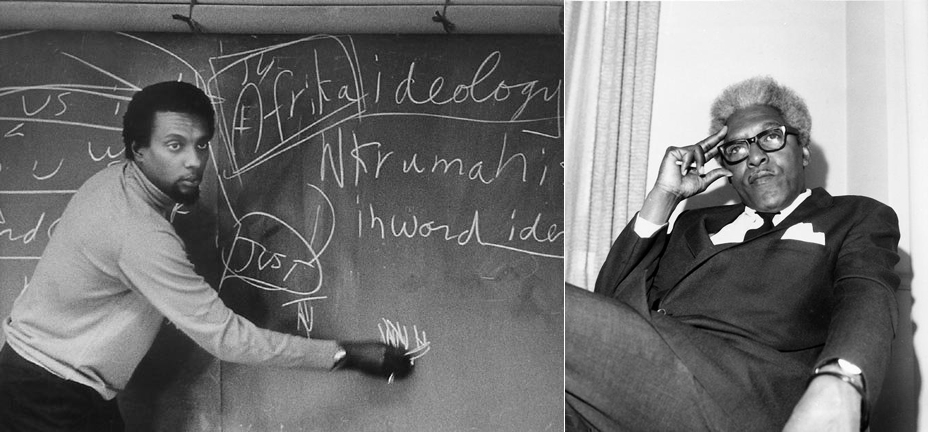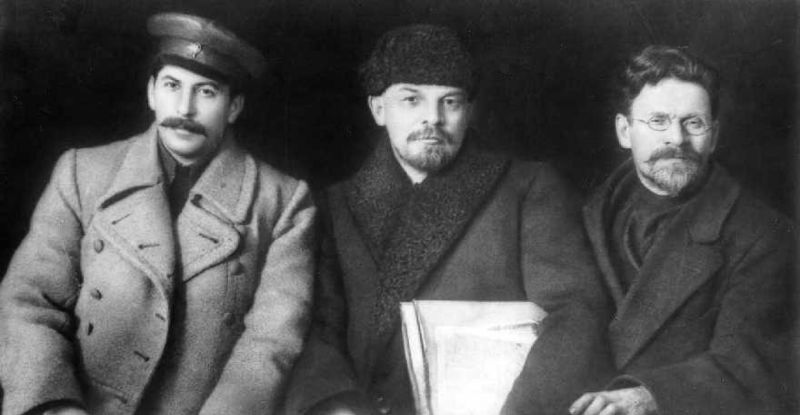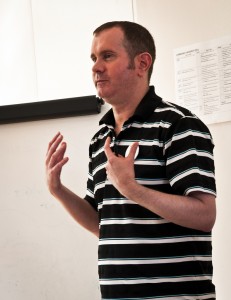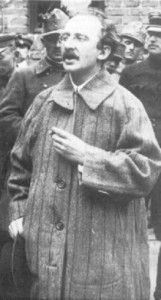Historical specificity, the temporality of capital, and the supra-historical
Chris Cutrone
Presented on a panel with Fabian Arzuaga, Bo-Mi Choi and G. S. Sahota at the Critical Historical Studies conference, Chicago Center for Contemporary Theory (3CT), University of Chicago, December 3, 2011.
History is a way the present relates to itself. History mediates the present, and anticipates the future. The relation of past and present in history is a social relation, a relation of society with itself, as a function of change. The proper object of the present is history: the present is historical; it is constituted by history. The present is history; history is the present. As Hegel put it, the “philosophical” approach to history is concerned with the “eternally present:” what in the past was always present. This is a function of modernity. What is at issue is the form of the present in history, or, the form of history in the present.
Three writings, by Nietzsche, Benjamin and Adorno, respectively, reflect upon the specific form of history in capital, and on the possibility of transcending the historicism that emerged in the 19th century, as it continued to inform the 20th: Nietzsche’s 1873 “On the Use and Abuse of History for Life;” Benjamin’s 1940 “Theses on the Philosophy of History;” and Adorno’s 1942 “Reflections on Class Theory.” Nietzsche’s essay inspired Benjamin’s; Adorno’s followed directly upon Benjamin’s.
Nietzsche and the genesis of history
Nietzsche’s second “untimely meditation” (or “unfashionable observation”), “On the Use and Abuse of History for Life,” critiqued what translator and Nietzsche scholar Peter Preuss called the 19th century “discovery” of history. Nietzsche regarded history specifically as a symptomatic expression of the genuine needs of the time. For Nietzsche, the symptom of history is expression of an illness, but Nietzsche’s approach to such illness is as to “pregnancy:” not to be cured in the sense that it is eliminated, but rather undergone successfully to bring forth new life.
19th century historicism was, for Nietzsche, the hallmark of a historically peculiar form of life: modern humanity. Modern humanity is historical in a precise sense: “history” is historical. For Nietzsche, the question is what the symptom of history indicates about the need for humanity to overcome itself in present form. Nietzsche’s expression for this potential self-overcoming of historical humanity is the “supra-historical.” It points beyond history, towards a new form of life that is possible in history.
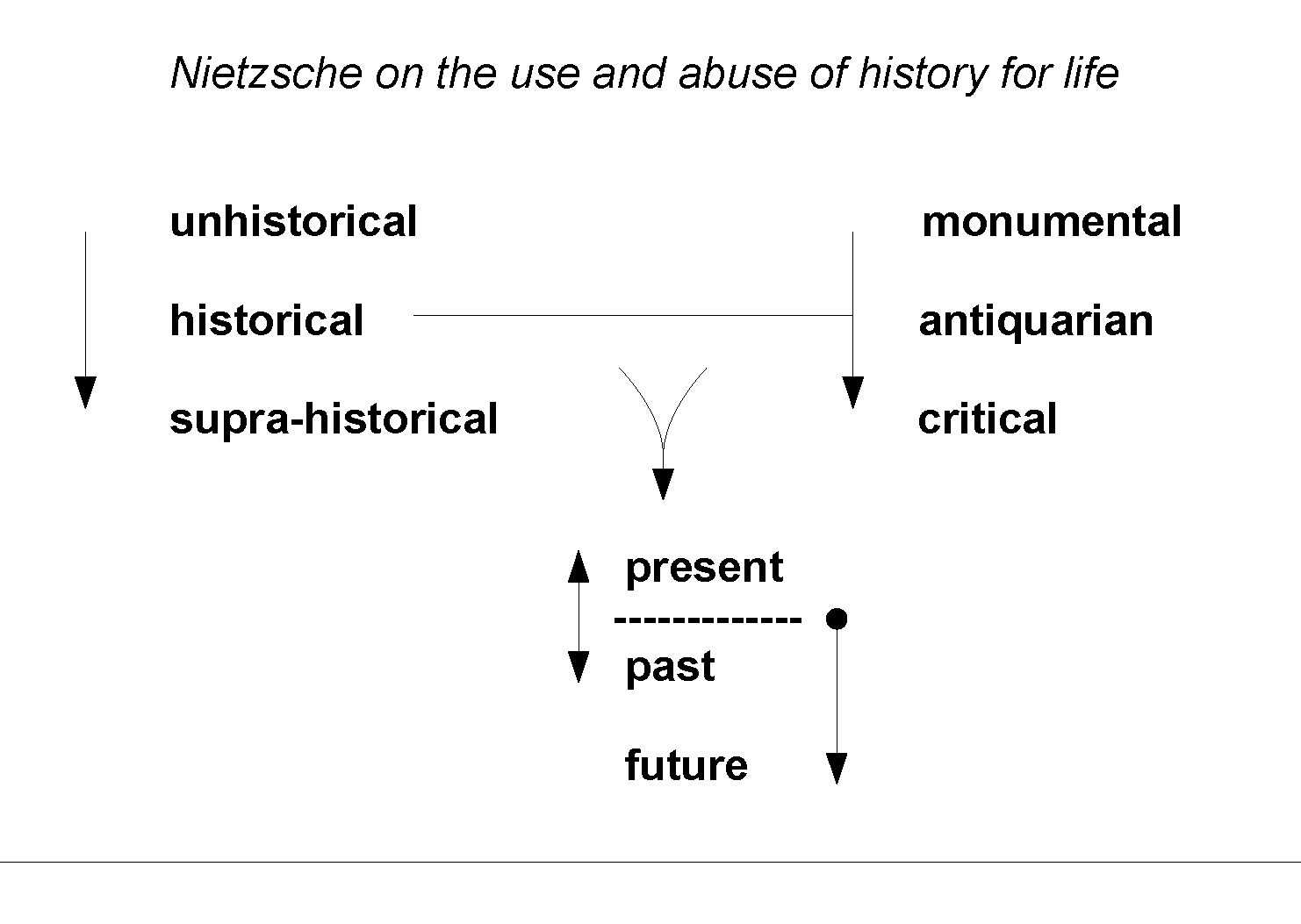
For Nietzsche, there are three forms of the historical: the “monumental;” the “antiquarian;” and the “critical.” Nietzsche addressed these different phases of the historical as expressing different “uses” or needs for the historical in the “life” of humanity. In each of them the past figures differently. The forms of the historical are distinguished from the greater three categories with which Nietzsche’s essay is concerned: the “unhistorical;” the “historical;” and the “supra-historical.” The latter three categories refer, respectively, to the pre-human, the human, and the supra-human. Humanity becomes itself through history; and it potentially overcomes or transforms itself in transcending itself as historical. As Preuss pointed out, history is the record of the “self-production” of humanity. Therefore, the transformation of humanity, the changes in its self-production, changes history, and changes what the past is for humanity. In this respect, it is possible to address Nietzsche’s essay as indicating the possibility for going beyond the historical, or overcoming the present relation humanity has to itself, in and through history.
Benjamin and Adorno on Nietzsche and Marxism
Benjamin, and Adorno following him, appropriated Nietzsche’s account of history for their Marxist critical theory of the “philosophy of history,” specifying Nietzsche’s symptomology of history as symptomatic of capital. For Benjamin and Adorno, Nietzsche’s account of history was historically specific to its moment of capital, the late 19th century, with further implication for the 20th century.
What would it mean to get “beyond history?” First, it is necessary to identify, as Adorno put it, “what history is:” its possibility and necessity. For Benjamin, history originates in the demand for redemption. Following Benjamin’s “Theses on the Philosophy of History,” and responding to Marx and Engels’s Communist Manifesto, in “Reflections on Class Theory” Adorno wrote that,
According to [Marxian] theory, history is the history of class struggles. But the concept of class is bound up with the emergence of the proletariat. . . . By exposing the historical necessity that had brought capitalism into being, political economy became the critique of history as a whole. . . . All history is the history of class struggles because it was always the same thing, namely, prehistory. This gives us a pointer as to how we can recognize what history is. From the most recent form of injustice, a steady light reflects back on history as a whole. Only in this way can theory enable us to use the full weight of history to gain an insight into the present without succumbing in resignation to the burden of the past.
This relation of pre-history, history, and a potential post-historical condition was, for Adorno, the relation of the present to the “burden of the past:” can it be redeemed?
Adorno addressed a certain problem in Marxism’s so-called “dialectical” approach to history, in that it tended to be, paradoxically, one-sided:
[Marxism has been praised] on account of its dynamism. . . . Dynamism is merely one side of dialectic: it is the side preferred by the belief in practicality. . . . The other, less popular aspect of dialectic is its static side. . . . The law that, according to the Hegelian dialectic, governs the restlessly destructive unfolding of the ever-new consists in the fact that at every moment the ever-new is also the old lying close at hand. The new does not add itself to the old but is the old in distress.
This was Adorno’s interpretation and attempted further elaboration of Benjamin’s injunction to read history “against the grain” (Thesis VII). But what did Adorno mean by “the new?”
Potential futures are generated out of the relation of past and present, out of the relation of the present to itself through history. The dynamic of history is inherent in the self-contradiction of the present: history is a projection of it. What is the “practicality” of history? The emergence or departure of the new is the self-overcoming of the present, or the self-overcoming of history: its immanent transcendence. Nietzsche’s phrase, “self-overcoming” is, literally, the “Selbstaufhebung:” self-fulfillment and self-negation. The present provides an opportunity for the self-overcoming of history.
The “new is the old in distress” because it is the present in tension with itself: is the present merely the ever-same? The “static side of the dialectic,” in which the “ever-new is the old lying close at hand,” means that, as Benjamin put it, “every second is the strait gate through which the Messiah [redemption] might enter” (Addendum B). The “homogeneous” and “empty” time of the ever-same is also, potentially, the “full” time-of-the-now (Jetztzeit). History is dialectical, but it is a “negative” dialectic of the present: the present, in its potential for self-overcoming, disintegrates as history disintegrates into the mere facticity of the past. Historicism is a symptom of failed self-overcoming. For Benjamin, the task was to “construct” history, rather than to merely “add” the new to the old (Thesis XVII). This is the contrast Adorno found between the new as “the old lying close at hand” and the “restlessly destructive unfolding of the ever-new” that is “always the same thing, namely, prehistory.” The “static side” of the dialectic of history is thus a resource. The question is whether it is a resource for the emergence of the new or the perpetuation of the old: either, or both.
Nietzsche’s “untimeliness”
The discontent of history is the source of Nietzsche’s “untimely thought.” What potential critique of the present does history offer? Nietzsche recognized himself as a product of 19th century historicism. Nietzsche characterized as “antiquarian” the deadly transformation of history into the mere facticity of the past. As a Classical philologist, Nietzsche was well prepared to address the melancholy of modernity expressed in historicism. As Benjamin put it, quoting Flaubert, “Few people can guess how despondent one has to be in order to resuscitate Carthage” (Thesis VII). (The reference to Carthage echoes that with which Nietzsche began his essay, the Ceterum censeo [“I judge otherwise”] of Cato the Elder: “Carthago delenda est [Carthage must be destroyed].” As Nietzsche put it, this was the spirit with which his “consideration of the worth and the worthlessness of history” began.) In response to such threatening acedia, Nietzsche contrasted his “critical” approach to history.
Here it becomes clear how badly man needs, often enough, in addition to the monumental and antiquarian ways of seeing the past, a third kind, the critical: and this again in the service of life as well. He must have the strength, and use it from time to time, to shatter and dissolve something to enable him to live: this he achieves by dragging it to the bar of judgment, interrogating it meticulously and finally condemning it; every past, however, is worth condemning.
This approach, Nietzsche pointed out, was counter to the historicist passion of his time, the prevalent “consumptive historical fever.” Nevertheless, Nietzsche found his own philological concerns to motivate a certain dissatisfaction with the ethos inherent in “the powerful historical tendency of the times, as it has been, by common knowledge, observed for the past two generations, particularly among the Germans” since the early 19th century.
I must be allowed to ascribe this much to myself on account of my profession as a classical philologist, for I would not know what sense classical philology would have in our age unless it is to be effective by its inappropriateness for the times, that is, in opposition to the age, thus working on the age, and, we hope, for the benefit of a coming time.
The consummation and self-destruction of 19th century historicism in Nietzsche presented the demand for the “supra-historical,” for getting beyond the historical comportment that had produced Nietzsche, a self-overcoming of history.
Beyond history?
The question of getting beyond history relates to Nietzsche’s characterization of “critical history,” that is, the possibility and necessity of “condemning a past” in creating what he called a “new nature.” This is the need to forget. This is not the forgetting that might be taken to characterize the unhistorical, animal condition (according to Nietzsche, the unhistorical condition is that of the grazing animal, which does not speak because it immediately forgets what it was going to say). “Forgetting,” in Nietzsche’s sense, is an activity in service of life: it can only be considered, not unhistorical, but post- or supra-historical, that is, a form of historical forgetting that overcomes a form of remembering. There is a human need to forget that is not natural but develops: it is a new need.
For Benjamin, the need to “forget” is related to the need to “redeem” history. “Redeemed” history could not only be potentially “cited” in “all its moments,” but also, more importantly, forgotten. The need to remember is matched by the need to forget. So, the question turns on the necessity for remembering that would need to be overcome in order to make forgetting, in a transcendent sense, possible and desirable.
Benjamin’s concept of historical redemption in the “Theses on the Philosophy of History” was informed by the correspondence he conducted with Horkheimer on the Arcades Project (for which the “Theses” were drafted as an introduction), specifically concerning redemption. Horkheimer pointed out that any redemption must be qualified: the dead remained dead; their sacrifice could not be redeemed in certain respects. For Benjamin, this affected the quality of history: it became the record of wasted potential, or “barbarism.” This was history’s standing reproach to the present.
If, for Nietzsche, “critical history” means standing in judgment over history, by contrast, for Benjamin, the critical value of history was in its judgment over the present: history was an effect of the present’s judgment of itself. What does the present need to remember; what to forget? What does it need to judge? If Nietzsche called for the historian to be “man enough” to judge the past, for Benjamin, the required “strength” was to receive history’s judgment and not be devastated by it: the memory of “enslaved ancestors” (Thesis XII). For the nature and character of both the ancestry and the enslavement were precisely the matters to be judged, remembered and forgotten. From what are we descended, and from what must we free ourselves? How do we judge this?
Capital as form of history to be redeemed
Adorno identifies “how we can recognize what history is” by the “steady light” reflecting “from the most recent form of injustice.” The theory that is thus enabled, without succumbing to the past, must be able to distinguish the potential for the present to depart from the “ever-same.” For Benjamin, this “Messianic” potential for redemption available in every present moment is the product of two opposed vectors: regression and stasis. The “static side” of the historical dialectic that Adorno identified was, for Benjamin, the potential “exploding” of the “continuum of history” (Thesis XVI), a “standstill” (Thesis XVI), or “activating the emergency brake on the locomotive of history” (Paralipomena Thesis XVIIa). The motivation for this was the “regression of society” (Thesis XI). Otherwise, one might “succumb,” “in resignation to the burden of the past.”
Capital presents an apparently unredeemable history, at least in any traditional (theological) sense of redemption. Benjamin was no melancholic but rather sought to diagnose and potentially overcome the melancholy of modernity. But this could only be achieved immanently, from within modernity’s “dialectic” of history. This dialectic had, for Adorno, two sides: dynamic and static. The dialectic of history in capital is one of constantly generated but wasted new potentials. This is its “injustice,” what gives modernity its peculiar, specific melancholy, affecting its demand for redemption. While all of human history may have been characterized by the Messianic demand for redemption, modern history’s demand for redemption is specific and peculiar. Modern history liquidates all prior history, however rendering it, according to Benjamin, more as “rubble” (Thesis IX) than as resource.
Modern history ruins prior forms of redemption, in favor of what is, for Benjamin, a specious form of remembering: history as the accumulation of mere facts. What would be its “opposite?” The traditional Messianic eschatological “end of time” is matched by the modern “monstrous abbreviation” that summarizes the entire history of humanity (Thesis XVIII) in capital: an appropriation of all of history that threatens to become its barbarization. For Benjamin, this must be countered by a constructed “constellation,” in which the demand for the redemption of history transforms the time of the present into one of potential secular redemption: not the negation of time as in the coming of the Messiah, but the redemption of time, in time (Addendum A). This would amount to the effective transformation of history, a “fulfillment” of the “here-and-now” appearing as a “charged past” that has the ability to “leap into the open sky of history” (Thesis XIV) as opposed to subordination to a “chain of events” (Thesis IX) or “causal nexus” (Addendum A). Neither celestial redemption outside of time nor secular time without redemption, Benjamin’s philosophy of history seeks the relation of modern temporality to the transformed demand for redemption.
The question is how to overcome the ideological abuse of history to which it is subject in modernity. This abuse is due to the form of temporality in capital. For Benjamin, this concerns the “citability” of the moments of the past, which modern society makes possible — and necessary. This is no mere addition to knowledge of the past, a quantitative increase, but rather the fundamental qualitative transformation of what counts as historical knowledge, the self-knowledge of humanity as a function of time. Is the self-production and self-transformation of humanity a function of time? In capital, this is the case, but in a certain sense, producing what Benjamin called a “causal chain” of events “anterior” to the present. However, such spatialization of time, once, historically, did not, and so, potentially, would no longer, pertain in a “supra-historical” condition for humanity, as prognosed by Nietzsche.
The temporality of capital
From the transformation of time in time, it becomes possible to turn the “abbreviation” of time in capital into the potential supersession of the form of change as a function of time. From Nietzsche’s “critical” approach to history, as an active appropriation of the present, Benjamin turned to the reception of history as critical to the present: the present as crisis of history. Where, for Nietzsche, the culmination of history was the crisis of the historical, and the possibility for a supra-historical form of humanity, for Benjamin, the culmination of the peculiar historical comportment of modern humanity is the crisis of history, the crisis of humanity. All of history becomes citable, but as amalgamation. Where, for Nietzsche, a future changed condition “must come” if humanity is to survive, for Benjamin, if history is to be redeemed, humanity must be transformed. (Benjamin: “Humanity is preparing to outlive culture, if need be;” this is Nietzsche’s “strange goal.”)
As Adorno concluded his “Reflections on Class Theory,” “This means, however, that dehumanization is also its opposite. . . . Even if the dynamic at work was always the same, its end today is not the end.” The transformation of humanity envisioned by Benjamin and Adorno, appropriating Nietzsche’s discontent in history, was one that would transcend all historical culture “hitherto.” Benjamin and Adorno matched Nietzsche’s “rumination” with Marx and Engels’s Manifesto. The self-overcoming of the entire history of civilization and of its “process of transmission” (which cannot be avoided but only “reversed,” pointing not to the future but the past) would be “against the grain” of the historical progress that can only be regarded as “regression:” the inversion of the meaning of history; the end of history as the end of pre-history in the present, or, the potential redemption of the history of civilization that capital makes possible of itself.
The dialectic of memory and forgetting involves changes in both the forms of remembering and the process of forgetting. A form of remembrance is a way of forgetting. It serves a certain way of life. To remember is to forget in a certain way; to forget is to overcome a certain need to remember, and to overcome the past in a certain way. If the present is an effect of history, then it is in the way the past causes the present.
Why is the past, in modernity (according to Benjamin, following Nietzsche), “citable” in all of its moments? Because all of history is (potentially) negated by capital — just as it is (potentially) fulfilled by it. The question is the possibility and necessity of the appropriation of all of history in capital. The mode of appropriation of the past in capital, its “process of transmission,” is the society prevailing throughout “all of history:” “barbarism.” This means that all moments of the past potentially become culpable in capital, by becoming the endless resource of the present: history. Capital is the literal “Aufhebung” of history. But can capital become the Selbst-aufhebung of history? Or does modern history exhibit, rather, a dynamic that is alien to all of history, as it was practiced hitherto (prior to the challenge of modernity)? Is capital the potential for redemption in history, or its ultimate denial, its final liquidation? The fundamental ambivalence of history in capital is the key to what it is: an injustice to be made good. This is what capital has promised humanity at the end of history. Can it be fulfilled? Will it? (( This link between redemption and forgetting has its utopic as well as dystopic valences. As Kafka wrote in conclusion of his last published story, “Josephine the Singer, or the Mouse Folk” (in The Complete Stories, trans. Willa and Edwin Muir [New York: Schocken, 1995], 360–376), in a decidedly non-human, zoomorphic parable:
“Josephine’s road, however, must go downhill. The time will soon come when her last notes sound and die into silence. She is a small episode in the eternal history of our people, and the people will get over the loss of her. Not that it will be easy for us; how can our gatherings take place in utter silence? Still, were they not silent even when Josephine was present? Was her actual piping notably louder and more alive than the memory of it will be? Was it even in her lifetime more than a simple memory? Was it not rather because Josephine’s singing was already past losing in this way that our people in their wisdom prized it so highly?
“So perhaps we shall not miss so very much after all, while Josephine, redeemed from the earthly sorrows which to her thinking lay in wait for all chosen spirits, will happily lose herself in the numberless throng of the heroes of our people, and soon, since we are no historians, will rise to the heights of redemption and be forgotten like all her brothers.” (376) )) | §
Bibliography
Adorno, Theodor W., “Reflections on Class Theory,” trans. Rodney Livingstone, Can One Live after Auschwitz? A Philosophical Reader, ed. Rolf Tiedemann (Stanford, CA: Stanford University Press, 2003), 93–110.
Benjamin, Walter, “Theses on the Philosophy of History,” trans. Harry Zohn, Illuminations, ed. Hannah Arendt (New York: Schocken, 1968), 255–266; “On the Concept of History,” trans. Dennis Redmond (2005), available on-line at: <http://www.marxists.org/reference/archive/benjamin/1940/history.htm>; “Paralipomena to ‘On the Concept of History’,” Selected Writings vol. 4 1938–40 (Cambridge, MA: Harvard, 2006), 401–11.
Nietzsche, Friedrich, “On the Use and Abuse of History for Life,” trans. Ian Johnston (2010), available on-line at: <http://records.viu.ca/~johnstoi/nietzsche/history.htm>; On the Advantage and Disadvantage of History for Life, trans. Peter Preuss (Indianapolis, IN: Hackett, 1980).
Note
 (Cover of Time magazine vol. 175 no. 28 December 26, 2011–January 2, 2012, design by Shepard Fairey.)
(Cover of Time magazine vol. 175 no. 28 December 26, 2011–January 2, 2012, design by Shepard Fairey.)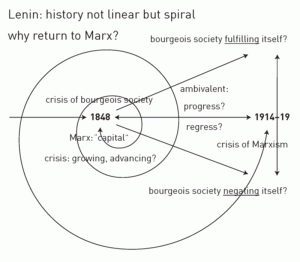 (Lenin: history not linear but spiral. [PDF])
(Lenin: history not linear but spiral. [PDF])
